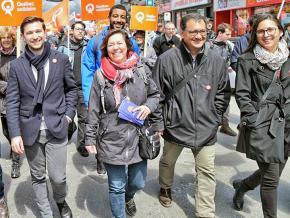Charting a path for Québec solidaire
Québec solidaire (QS) was formed in 2006 to unite socialists, feminists, environmentalists and other radical activists to provide a left political alternative in Quebec. QS members have played an important role in social struggles like mass student strikes. Here, , a member of the Québec solidaire National Coordinating Committee, reports from a meeting of QS delegates to debate the party’s positions on key questions in the run-up to elections.
SOME 200 delegates from all regions of Quebec came together on May 11-13 for the last national meeting of Québec solidaire before the election anticipated for October 1. Among them were around 50 of the candidates that the party will be running in the election.
On May 11, the highlight was a tribute to Amir Khadir, the first member of the National Assembly from QS, elected in December 2008. He announced a few days earlier that he won't run for another term.
Khadir expressed his confidence in the strength of the party and its ability to renew its leadership. He also indicated his intention to continue being involved in the party in new ways after his term in office is over.
As confirmation of Khadir's optimism about the renewed leadership, the meeting decided that Manon Massé, elected to the National Assembly in the previous election in 2014, would be our candidate for prime minister. This has to be decided as a specific question since the party doesn't have one leader, but two spokespersons.

THE MAIN debate of the weekend took place on Saturday morning, on the Plan for an Energy and Economic Transition. The goal of the discussion was to better frame the work being done on the plan, which will be released during the election campaign.
Most of the interventions focused on the issue of what the target in greenhouse gas emissions reduction should be for 2030. The program adopted in 2011 and revised in 2016 mentioned a goal of 67 percent reduction for that year and 95 percent for 2050.
But a growing consensus involving environmental groups and progressive economists considered the 67 percent target impossible to achieve within the framework of a just and democratically managed transition. The decision, taken with over 90 percent support, was to change that target to a minimum of 45 percent.
Over the next few weeks, a working group of the party will finalize the plan and try to come up with a combination of policies and measures that could bring the target higher. But the basic principle agreed on is that the target should be the anticipated result of specific policies, and not an arbitrary number, like the current target of 37 percent set by the Liberal government that has no credible path to being accomplished.
The environmental focus of the weekend's discussions gave the party an opportunity to reveal one of its key proposals for the election campaign: a 50 percent reduction in the cost of public transit for all users in the first year of a QS government.
This is an effective way to bring about an increase in the use of public transit as well as a social justice policy benefiting those who already use it. The platform states that our goal is to make public transit completely free by 2028.
In his speech on the Sunday morning, QS spokesperson Gabriel Nadeau-Dubois denounced the inaction, half-measures and empty promises of the other parties when it comes to fighting climate change. He pointed out that they always end up preserving the privileges of corporations and the wealthy, including oil, gas and mining corporations and those who own them.
The other proposals that have been put forward by the party over the past few months include the $15-an-hour minimum wage, universal public dental insurance, the end of public subsidies for private schools and a cap on the compensation for executives of corporations that receive government support.
What all these policies have in common is that they take the side of working people and the poor. It seems increasingly clear that the QS campaign for 2018 will be based on a class perspective, presenting QS as the party of the people against the three parties of the elites and the rich.
This approach has recently influenced the party's statements on issues of religious accommodation and secularism, as well as immigration and refugees' rights.
Nadeau-Dubois criticized the other parties for trying to make political gains either by scapegoating religious minorities and migrants (from Parti Québécois and Coalition avenir Québec) or by using empty rhetoric in favor of their rights not backed by real action (from the Liberals).
Nadeau-Dubois opposed the scapegoating rhetoric of mainstream political leaders and stated that QS will focus on issues important to all people, including immigrants and minorities, like social justice and environmental questions.


